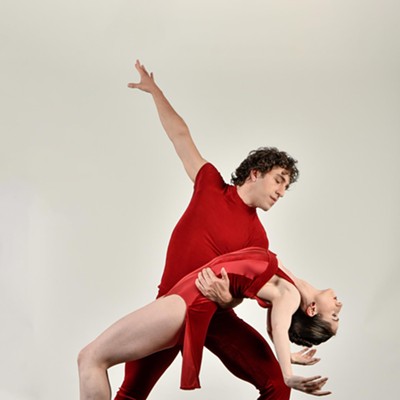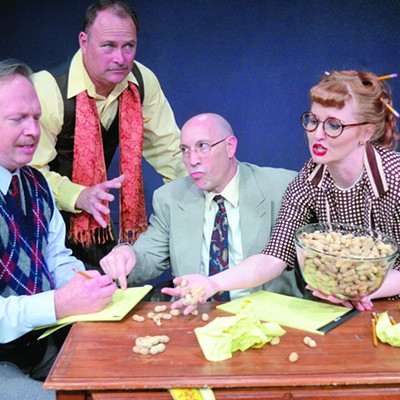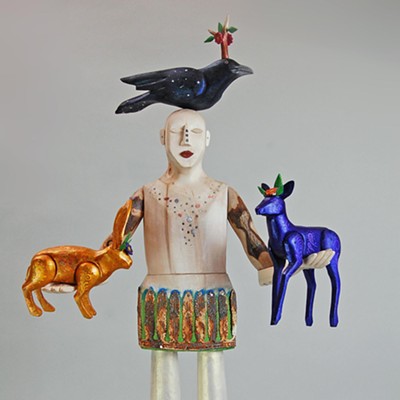Local Readings
A Night of Poetry
7 p.m., Friday, Oct. 16
Antigone Books
411 N. Fourth Ave.
792-3715;
Antigone Books has long supported authors from all walks of life, and this Friday's poetry reading will continue the tradition with three award-winning Tucson writers. Alison Deming, Boyer Rickel and Pamela Uschuk have all read at Antigone before and will return to share new work.
Uschuk, who lives in Tucson and Colorado, will read from her new collection, Crazy Love: New Poems. She incorporates nature into life, love and even politics in what she calls her dense collection of work. Uschuk will also read from her chapbook Pam Uschuk's Great Hits. She is a professor at Fort Lewis College in Durango, Colo., where she teaches poetry and environmental literature. She has worked with the UA Poetry Center, too.
Rickel will be reading from his new chapbook, reliquary, and will share prose poems he published last year in a collection called remanence. He's read at Antigone before during a number of LGBT events. He also teaches in the Creative Writing Program at the UA. More information on Rickel can be found at his Web site, www.boyerrickel.com.
Deming, a professor of creative writing at the UA, has a new poetry collection called Rope. She says she had been working on it for a few years and found that the word rope is a metaphor for poetry: A rope is strong but made from small fibers that are very weak. What makes those weak fibers strong in her collection?
"I was inspired by Greek myth and scientific experiments," says Deming.
The reading is free and open to the public. It will be followed by a question-and-answer period with refreshments. —A.P.
Sampling or Theft?
Screenings of Copyright Criminals
4 p.m., Friday, Oct. 16
Golf Links Branch Library
9640 E. Golf Links Road
2 p.m., Sunday, Oct. 18
Valencia Branch Library
202 W. Valencia Road
791-4010
When words like "dank," "phat" and "crunk" hit the mainstream, there is always that guy who claims that the words are his creation. We all just shake our heads and move on, but in music today, everyone is asking the question: Can you own a sound?
Throughout October, local libraries will work with Arizona Public Media to hold screenings of Copyright Criminals, a film created by Benjamin Franzen and Kembrew McLeod that considers this touchy issue. It will be shown as part of a series of monthly screenings from the PBS show Independent Lens.
Some artists claim that music evolves by reworking old sounds. Music sampling—borrowing parts of previously recorded tracks—has become common in the hip-hop business. When record-company lawyers began cracking down on artists who reused old sounds, some cried that creativity was being curtailed.
"It's interesting to see that the music laws are not keeping up with the new technology," says Adriana Rendon, a reference-services librarian at the Pima County Public Library. "And you get to see both sides of the debate."
Artists like Public Enemy appear in the film to discuss the copyright law that artists have been struggling with since well before Napster and YouTube became legal hot-buttons.
Just because you don't know all the words to Kanye's latest hit doesn't mean that you won't appreciate Copyright Criminals.
"People from an older generation will recognize artists from their youth, because it is about music that has been around for the last 20 years and is infused in music today," says Rendon.
The screenings are free and will be followed by a moderated discussion. —E.N.
Girls Make Their Moves
All Queens Chess Day
1 to 4 p.m., Sunday, Oct. 18
Bookmans Entertainment Exchange
6230 E. Speedway Blvd.
748-9555;
Tucson's 9 Queens Initiative offers a free monthly chess workshop for women and girls. In August 2008, Jean Hoffman helped start the workshop series, and this week's All Queens Chess Day is a celebration honoring past workshop participants.
9 Queens educates at-risk youth and girls about chess. Through their chess education, 9 Queens promotes critical-thinking skills and better academic performance. They have four programs in Tucson: a girls' academy, an afterschool program, teacher training and a classroom program.
Hoffman says that women are under-represented in the game nationally—and these programs are helping to change that. The local workshops are opening doors and creating a larger chess community in town, she says.
"Hundreds of women have participated in 9 Queens chess workshops this past year," says Hoffman. "Some women have branched out and created their own weekly chess clubs, meeting at places like coffee shops."
The success of 9 Queens has increased the percentage of female chess players. According to the organization, local beginners' sections have increased from being 10 percent women to 50 percent.
Sunday's event at Bookmans is being touted as Tucson's first all-female chess tournament. There will also be workshops and arts and crafts in separate rooms that everyone, male or female, is invited to participate in. Workshops will be taught by the Arizona Scorpions, the state's only professional chess team.
The event is slated to become an annual tournament. This year's event will be co-hosted by City Council members Regina Romero, Nina Trasoff and Karin Uhlich, as well as Beth Walkup, the wife of Mayor Bob Walkup.
It's free to participate. To pre-register, e-mail jhoffman@9queens.org. —A.P.
Different Tucson Perspectives
Finding Voice
Opening reception: 5 to 7 p.m., Friday, Oct. 16
On display noon to 6 p.m., Monday-Friday, through Nov. 13
UA Student Union Gallery
1303 E. University Blvd.
621-6142
In late 2006, local teaching artist Josh Schachter was interested in doing photography with refugee and immigrant youth. He got in contact with the International Rescue Committee, which put out a call to Tucson teachers to collaborate with Schachter and develop a curriculum. Tucson Unified School District teacher Julie Kasper got involved, and the two have been working together since.
The result of that collaboration is Finding Voice, an exhibition of photographs, writing and digital stories, all created by international students at Catalina High Magnet School. Schachter and Kasper use literacy and visual arts to help students develop English skills and learn about social issues within their communities. Schachter says the art offers students a way to to learn how to speak out for themselves while learning more about Tucson and U.S. culture, while still exploring their own heritage.
"This is essentially a retrospect by refugee and immigrant youth," says Schachter. "It's about where they're from, their home, Tucson and their future."
He says that people who see the students' work will get a sense of Tucson culture and landscape from the eyes of young people who are new to the area. He hopes this exhibit will create a dialogue between Tucsonans as they see themselves from a different perspective.
At the Oct. 16 reception, Schachter and Kasper will speak, as will students who participated in the project. The event is free. For more information on the project, visit www.findingvoiceproject.org. —A.P.







